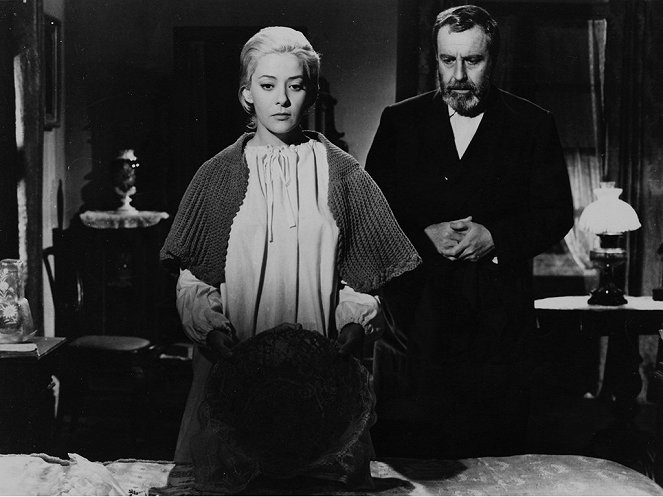Director:
Luis BuñuelCámara:
José F. AguayoReparto:
Silvia Pinal, Francisco Rabal, Fernando Rey, José Calvo, Margarita Lozano, Victoria Zinny, Claudio Brook, José Manuel Martín, María Isbert, Joaquín Roa (más)Sinopsis(1)
Viridiana es una joven novicia que está a punto de tomar los hábitos, cuando decide abandonar el convento para visitar a su tío Don Jaime. Rápidamente y debido al gran parecido de Viridiana con su difunta esposa, Don Jaime se siente atraído por su sobrina. Intenta poseerla aunque finalmente no se atreve y Viridiana decide marcharse. Los acontecimientos se precipitan y Viridiana vuelve a la mansión donde, fiel a sus convicciones cristianas, acogerá a un grupo de vagabundos a los que dará asilo y alimento. La llegada de Jorge, su primo, cambiará para siempre el destino de la joven. (José Esteban Alenda S.A)
(más)Reseñas (3)
Luis Buñuel's famous work has, of course, lost its edges in many ways. Yes, contemporary cinema can certainly be more shocking, but, with all due respect to it, contemporary cinema can hardly go straight to the essence and, without unnecessary exaggeration, reveal the misery of mercy and austerity to the bone. Buñuel is a great aesthete, and I hunt in vain in my memory for a film with such a magnificent and organically integrated composition of the image... The aforementioned scene of the beggar feast is one of the highlights not only of the film, but of cinema as a whole. The perfect pointing-out of the idea through the paradoxical combination of image, music and their overall composition (the paraphrase of L. Da Vinci is eerily cynical heresy!) creates an incredibly impressive whole, from which the character of Viridiana, a beautiful woman committed to God and the service of the "suffering", must necessarily come out foolish and doomed to defeat. No wonder that the Church was irritated by it... Viridiana attacks with sensitive and supremely artistic means, not to insult and shout angrily, but only to reflect on the absurdity and true face of human nature. The absurdity of human action. If you save one suffering dog, you'll miss out on saving another one in no time. If you help a beggar out of the mud, he'll try to smear you. I watched Viridiana with a strange tremble and tension that only the films of the great masters arouse in me. It did not come from a surface that was seemingly peaceful and sedated, but rather it was based on the heart of a film in which the tragedy of a woman who dedicated her life to a great idea and was endowed with one great emptiness and disillusionment is born. With some criticism, I only look at Buñuel's all-embracing skepticism, but it is every artist's right to be subjective... Actually, that's what he's expected to do, right? The thorn crown burning scene seems to me like a really strong ace for the time period...
()
Después de leer la biografía de Buñuel, mi interés por sus películas aumentó aún más. Después de "El perro andaluz", elegí la igualmente famosa "Viridiana", que me sorprendió enormemente. La primera parte de la película es lenta, seria, hay una tensión sofocante en el aire, luego la película se convierte en un tono ligeramente cómico. Siempre disfruto enormemente de las diversas figuras humanas que Buñuel tuvo que buscar durante mucho tiempo para esta película. Excelente película con la magnífica Silvia Pinal en el papel principal.
()
The message is very well conveyed in the movie, but unfortunately, that doesn't necessarily mean it will truly captivate you. There are scenes that are pleasantly different, unreal in their representation of reality, but there are also those that create a challenging path to the movie and its reception. Criticism of religion, however, is pleasant, no doubt, it's just somewhat alienating.
()

